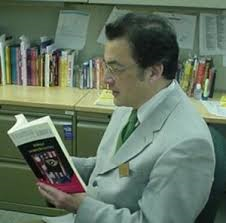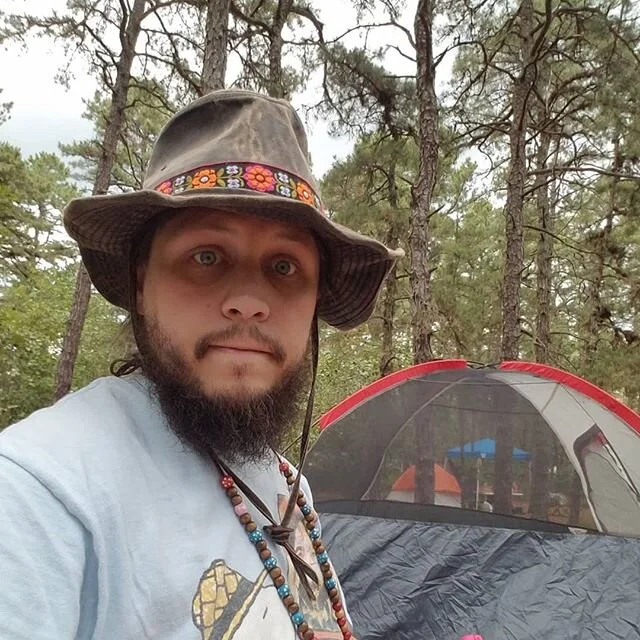At the Tattoo Studio
(Bakunawa, mythical dragon of the Philippines)
by Alfred Encarnacion
The bearded tattooist assures me
there’s no discomfort even though
I haven’t asked. He begins on my calf,
a smooth tracing of form
that slowly assumes shape & color:
slithering blue underbelly purpling
to the back’s black shimmering scales,
festooned body armed with fangs, claws,
folded wings about to spring open
while I sit watching his needle extract
a dragon as if trapped beneath my skin.
Released, the beast emblazons a lost
mythology my dead father
never thought to share:
Cebu in the ancient time when
seven moons, one for each night
of the week, lit the sky & brought
forth good fortune. But Bakunawa
the serpent dragon, craved
the lovely moons, sweet
as mangoes, and gobbled them
one by one until only a single moon
survived. Islanders prayed to Bathala
to punish the moon-eater that rose
each night from a sea cave to climb
the wind in search of prey. The pagan
god banished the dragon from sky, land
and sea until he learned repentance…
I close my eyes, breathe in the scent
of dragon blood that soothing
incense which fills this room,
slide back on the black recliner
and remember Bakunawa crawling my
father’s leg, emblem of his otherness,
remember the shame I felt when
a schoolmate blurted, “Your dad’s
a gook?” during Parent Teacher Night.
Bowing my head, I slunk away pretending
not to know the man who followed. But now
I wear the dragon, almost believing Bakunawa
vanished into the hearts of men who
betray, repent, and seek forgiveness,
lurks there to this day, rising only
in the tribal tattoo that bears his name.
How did you come to poetry? What role does it play in your life?
I became interested in poetry through the “folk rock” music of the 1960s, especially the poetic lyrics of songwriters such as Bob Dylan, Paul Simon, Buffy Sainte Marie, and Joni Mitchell. However, Leonard Cohen was the first lyricist whose published literary poetry (as well as the extraordinary postmodernist novel Beautiful Losers) I went out and bought. After reading, nay, experiencing his first few volumes of poetry I knew I had to try my hand at it as well. Once I was seduced by the power of the written word, writing became an extension of myself like breathing, eating, talking, walking, sleeping, dreaming…
Your poems are often very located. How does place influence your writing?
Even early on I was attracted to “place” in the work of poets I admired. I traveled to Montreal just to walk down St. Catherine Street because Cohen referred to it so much in Let Us Compare Mythologies, his debut collection. I later became obsessed with James Dickey and Richard Hugo; both of whom utilized “place” as an integral part of their poems. Think of the former’s “Hunting Civil War Relics at Nimblewill Creek,” and “Cherrylog Road, or the latter’s “West Marginal Way” and “"Degrees of Gray in Philipsburgh". Likewise, I found the work of Lisel Mueller strewn with place names that lent an authenticity that would not be available to the poems otherwise. I’m still obsessed with naming places in my past in order to memorialize those moments when I inhabited those places in real time.
You are the Director of the Stratford Public Library. Have you always known you wanted to be a librarian? In what ways has being a librarian influenced your writing or shaped the way you view the arts?
I never had any intention of becoming a librarian until I read a biography of Philip Larken, the poet librarian of Hull University’s Brynmor Jones Library. Suddenly a light came on: I always delighted in browsing through stacks upon stacks of books in the literature departments of public and academic libraries in Philadelphia where I lived at the time, but I never thought about a career in librarianship until the Larkin bio. I had finished up graduate school and most of my classmates were going on to their doctorate studies in the English Department at Temple or other universities. I had taught at Temple as an adjunct instructor, but I was more interested in writing as a vocation than teaching as a career. Instead of pursuing a Ph.D, I decided on a MLS and applied to Clarion University’s Library Science Department.
Before being appointed to a director’s position, I also worked both as a reference librarian as well as a children’s librarian. But most of my time was spent as a cataloger, which is becoming something of a lost art. Still, the seven years I spent assigning locations to new material and deleting weeded material sharpened my eye for clarity and consistency, and my cataloging skills I believe carry over to my poetry: I never attempted “a systematic derangement of the senses” as described by Rambaud (a dysfunctional childhood was derangement enough for me); instead; I pursued a consistent clarity in the anecdotal narratives that are at the heart of my poems. There’s such a strong narrative impulse in my work I sometimes think of myself as a recovering novelist (ha, ha).
I think libraries and poetry get shortchanged in their conceptualization (by larger society) as exclusively quiet, reserved, and introspective spaces. In your chapbook, Library Suite, you describe libraries as energetic and interactive places steeped in connection. How did this chapbook come together? What do you think the future looks like for libraries?
I’ve always believed that libraries were more than mere depositories for books, and I’ve labored to make Stratford Public Library—as is the case with most other 21st century libraries—an active resource of the community. This strategy allows for a diversity of programming: we offer culinary workshops, literary readings, classes in embroidery, presentations from representatives of State agencies, as well as ongoing programs such as Story Time and Lego for our younger patrons and Book Club, Book Café, and Crafter’s Corner for our adult patrons. We also make it a point to reach out to our senior patron population, often an underserved community, by offering senior-friendly high teas and chair-yoga sessions.
My chapbook is an attempt to document some of my experiences (some factual, some imagined, some a hybrid of the two) in Library Land these last couple of decades. Some poets don’t care to write about their professions, but I’ve always been drawn to writing about the various hats I’ve worn as waiter, teacher, librarian—once I even sold lightbulbs as a telephonic vendor! I’ve been often able to utilize my diverse working background in my career as a librarian.
Some predicted the end of libraries with the advent of the digital world: why go to a library when all the texts and information you desire is as close as your computer’s keyboard? We can all appreciate the instantaneous gratification that comes from access to the Internet: Ah, you found that new book by your favorite author and you can download it right there in your living room at 3am without having to wait until morning when the bookstores or libraries open. Who can resist such expediency? Still, there are those who prefer browsing the stacks at Barnes & Noble and/or their own local libraries for the undeniable tactile pleasure of holding the physical properties—weight, texture, smell—of a book in one’s own hand. We’ve already moved into a hybrid age for libraries where eBooks can be downloaded from their virtual website but hardcopies of books are still housed in physical buildings for patrons who prefer to choose their reading material by hand rather than keyboard. Rather than offering only bibliographical service, library staffs will also serve as informational brokers for patrons in need of guidance.
In your recently released collected poems, Precincts of the Passion-Dragon, many of the poems celebrate and illuminate the struggles of working class and immigrant families. How does your upbringing influence your poetic perspective?
|My childhood has everything to do with my “poetic perspective,” as you call it. I grew up in a predominately working class Polish and Irish community in the Port Richmond neighborhood of Philadelphia, where there were few Asian or immigrant families to speak of in the mid-1950s. I became painfully aware at an early age that I was not welcome there as a mestizo child (half Filipino, half White) with such a strange surname and such odd looks. I grew up feeling both ugly and alien and apart from the people around me. Many of my poems begin in a place of shame and move to a place of redemption or at least a place where toxic shame isn’t paralyzing the narrator. My mission in poetry has always been to find a strategy by which all that is toxic in memory can be revisited and transformed via art into something positive, maybe even something of service to others.
Where can readers keep up with your writing? Buy your books?
You will encounter my work in literary journals, such as the Paterson Review or Chautauqua Review, or in the Moonstone Art anthologies, or at readings in Philly or local Jersey readings like the one I’ll be doing in September at the Whitman Stafford House in Laurel Springs (date & time TBA). I’ll also be reading at the Poetry Center in Paterson, NJ on April 5, 2025 as one of the finalists for the Paterson Poetry Prize for Precincts of the Passion-Dragon: Poems 2000-2020. Much more information about my activities can be found on the Stratford Public Library’s website: https:www.stratfordlibrarynj.org
My books can be found/ordered in local bookshops such as Barnes & Noble, on Amazon.com or kelsaybooks.com. But, remember that for those readers with limited resources, you may read all the poetry, fiction, and nonfiction for free by visiting your neighborhood library and checking out books or requesting interlibrary loans. All you need is a library card and the dazzling Kingdom of Literature is yours!
Alfred Encarnacion has taught writing at Temple University, published in Florida Review, Indiana Review, North American Review, and the Paterson Literary Review. His books are The Outskirts of Karma, Ambassadors of the Silenced, Library Suite, and Precincts of the Passion-Dragon. He’s received five nominations for a Pushcart Prize; Library Suite was published via the Annual Moonstone Chapbook Contest, and Precincts of the Passion-Dragon has been chosen as a finalist for the Paterson Poetry Prize 2025. He’s the director of the Stratford Public Library in South Jersey, and he coordinates the Annual Poetry Reading at the Whitman Stafford House in celebration of National Poetry Month each April.
John Wojtowicz grew up working on his family’s azalea and rhododendron nursery in the backwoods of what Ginsberg dubbed “nowhere Zen New Jersey.” Currently, he works as a licensed clinical social worker and adjunct professor. He has been featured on Rowan University’s Writer’s Roundtable on 89.7 WGLS-FM and several of his poems were chosen to be exhibited in Princeton University's 2021 Unique Minds: Creative Voices art show at the Lewis Center for the Arts. He has been nominated 3x for a Pushcart Prize and serves as the Local Lyrics contributor for The Mad Poets Society Blog. His debut chapbook Roadside Oddities: A Poetic Guide to American Oddities was released in early 2022 and can be purchased at www.johnwojtowicz.com. John lives with his wife and two children in Upper Deerfield, NJ.



